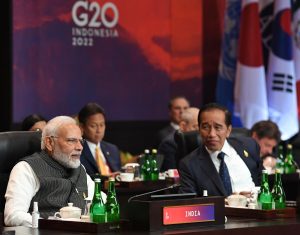With the conclusion of the G-20 Summit in Bali, Indonesia on November 15-16, India is next in line to host: it assumes the presidency of the grouping on December 1. India is becoming the president of the G-20 at a time when the global order is in flux and institutional mechanisms are under a strain. While India and the West view China’s growing economic and strategic footprint across the world as a threat to a rules-based order, the Russia-Ukraine war has further exacerbated the complexities.
India is inheriting a divided G-20. The faultlines were evident in the 17th summit of the G-20 in Bali. Going into the 18th summit in 2023, India would need to address this issue on a priority basis so that imminent concerns such as food security, climate change, supply chains, anti-terror mechanisms, and economic parity between developed and developing countries are not overshadowed by the differences existing among the G-20 member countries.
Even as the world’s top 20 economies come together to deliberate upon global issues, divisions exist within the group. The divisions are not just overt owing to the presence of Russia and China in the group; there are covert divisions among the rest of the members as well. Opposition to Russia and countering China seems to be losing steam among the G-20 members as national interests of individual countries are the major driving factors.
India has balanced its ties with both Russia and the West since the start of the Russia-Ukraine war. Despite being under direct and indirect pressure to side with the West, India has stood its ground and has continued engaging with Moscow. While defense cooperation remains a cornerstone of India-Russia relations, energy supply has emerged as a major area of cooperation, which has diversified the otherwise unidimensional ties. In October this year, Russia surpassed Iraq and Saudi Arabia to become the largest oil supplier to India. Despite India’s engagements with the United States and European countries, which have been growing stronger, India is showing no signs of abandoning Russia.
Similarly, Germany and France, major economies of the European Union (EU) and members of the North Atlantic Treaty Organization (NATO) are unwilling to toe the United States’ line anymore.
German Chancellor Olaf Scholz’s visit to China on November 4 attracted much attention and criticism from Western countries, particularly because Scholz became the first Western leader to visit China after the conclusion of the Chinese Communist Party’s 20th National Congress. While trying to project his visit as an opportunity to discuss the Russia-Ukraine war with China’s President Xi Jinping, Berlin’s keenness to maintain close economic ties with Beijing was evident in this visit despite reservations about China’s strategic maneuvers challenging the West.
France, another NATO member and a close U.S. ally, is showing willingness to work with Venezuela. This was evident after French President Emmanuel Macron and Venezuelan President Nicolas Maduro had a brief chat on the sidelines of the COP27 in Egypt. Macron also expressed hope that the Paris Peace Forum would set in motion negotiations between Maduro and his opponents to break the political deadlock in Venezuela. Venezuela remains a major oil producer in the world and a key member of OPEC.
The United States’ relations with its major ally in the Middle East, Saudi Arabia, are also under strain after the latter, in coordination with OPEC Plus, decided to cut oil production by 2 million barrels per day.
India has its work cut out as it takes over the presidency of the G-20. To prevent conflict and polarization, India has always proposed multipolar order and strong institutional mechanisms to protect the interests of all stakeholders. Holding the presidency of the G-20 is an opportunity for India to put into practice its propositions about the global order it visualizes.
India also finds itself in a unique position in 2023. In addition to leading the G-20, it is assuming the presidency of the Shanghai Cooperation Organisation (SCO) as well. The SCO is perceived as an anti-West organization. The leadership of two seemingly rival institutions could be an opportunity for India to drive home the point of the multipolar structure.
India’s proactive diplomacy during the Russia-Ukraine war with both sides has created the potential for New Delhi to play an important role in the conflict, possibly even as a negotiator of peace. The fact that India remains one of the few countries in the world enjoying the confidence of both the conflicting sides could lead to exploring solutions for ending the war. Despite continued engagements, India has been unequivocal in asking Russia to pursue dialogue and diplomacy instead of conflict. India has also highlighted the concerns of the Global South due to the Russia-Ukraine war.
As the president of G-20, which accounts for 80 percent of the world’s GDP, promoting multipolar order within the G-20 and strengthening the grouping as an institution would be the principal goal as well as a challenge. India must ensure that the G-20 members work around their differences and focus on the common global challenges.

































